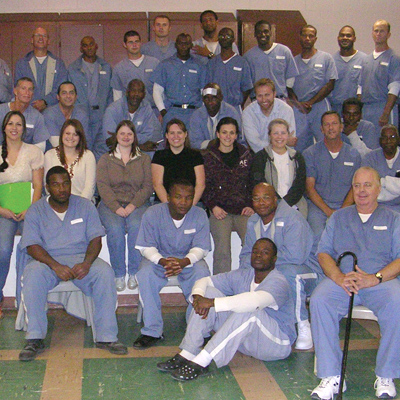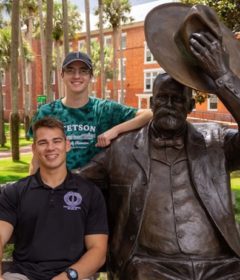Students help write a wrong

The long approach to Lawtey Correctional Institution is unsettling as much for its unbroken monotony as anything else: The highway a plumb line of hot macadam, the slash pines in ordered rows.
The prison, one of the largest in Florida, sits in the flyspeck of Starke, an eye blink of a town an hour west of St. Augustine, and there is little outside the walls but mobile homes and a railroad, all of it scattered along the edge of a National Guard camp.
Lawtey, itself, puts one less in mind of a prison than of a sprawling high school. There are low cinder block buildings painted institutional yellow with uniformed people milling around the gate. And razor wire, roll after roll, tangled along the chain-link fence that bowed inward as if shouldering an unbearable weight – it was the only soft shape to be found.
The gate buzzed, and I swung it open. I walked to a folding table where a man in khakis and a Florida DOC hat sat with a clipboard and a Guardian hand wand. He was in his early fifties, I guessed, with a patchy beard and eyes that closed down in the corners. I gave the man my name and emptied my pockets, took off my belt buckle and walked through a metal detector. The man handed me what appeared to be a small pager with a large gray button in the center.
“Clip it to your waist,” the man said. There’s a little clasp there on the back.”
“Panic button?”
“Something happens, hold it down for three seconds. Somebody’ll come running.”
“I’m just here to teach a class,” I said. The man looked up from his clipboard.
“I’ll be dogged,” he said. ”I guess you’re the guy from Stetson?”
That was January of 2010. A few months earlier, the English Department chair had opened a faculty meeting by reading from a letter requesting help to start and facilitate a fiction-writing workshop. The letter was eloquent and poignant, and before anyone else could speak, I asked for it. I wasn’t sure exactly what the workshop might entail — in fact, I was new to Florida and had no idea where Lawtey Correctional even was — but the opportunity seemed too intriguing to pass up. That afternoon, I began my correspondence with Larry and Reggie, the two men who started the class. It took the entire fall semester to hammer out the details and gain clearance from the Department of Corrections, but finally our workshop began. I had no idea at the time that two years later I would be escorting a group of Stetson students to conduct the first “Stetson- Lawtey Fiction Workshop,” a for-credit course, that allowed advanced writing students to not only teach the basics of fiction-writing to inmates, but to edit and publish a collection of work from the class. I shouldn’t have been surprised.
There was a desperate hungriness etched on the faces of those who had no choice but to write. Now and again, I find that look on the face of an undergraduate – one who, for half the semester, sat silently in the corner, but now, having turned in a first story, has suddenly been revealed as a writer. That first night at Lawtey, I saw that look all over the room.
Getting to Work, I threw everything I had at the class. It was wildly revelatory. Abilities varied, so much so that I was sometimes at a loss as to how to approach lectures. There were a couple of writers of the highest order. Others needed help with the most basic concepts: What is a first-person narrator? Why might the writer choose to use present tense instead of past? Gradually, I found that I should approach the class just as I approach my workshops at Stetson: with the highest expectations and the understanding that what we are collectively pursuing is art.
This wasn’t about self-expression. Or maybe, it wasn’t just about self-expression.
If you’re interested in writing, get to work. We got to work and in our second year decided we wanted some record of it. It was then that we began work on what became the first Lawtey fiction anthology. In a mad fit of coalescing, Chris Hazlett, a fellow volunteer from the University Florida’s English Department, and I assembled the work into a scruffy markedup pile.
It was invigorating work that gradually became maddening. A 90,000-word document had to be typed and line-edited. Outside of visits, my only contact with the class was via U.S. Mail. Thus there was something peculiarly antiquated about the revision process. I wanted permission to cut a line or reformat a page and felt trapped in the 19th century. But by midsummer, the manuscript was complete.
Thanks to the generosity of the Art and Melissa Sullivan Creative Writing Program at Stetson — which, I should say, has been ridiculously generous at every step — we self-published the book through the McNally Jackson bookstore in Brooklyn, N.Y. In August, we had a book launch: Little Caesar’s Pizza and 2-liter Cokes. It was a signing party reminiscent of yearbook day in high school, except more rewarding and a lot more fun.
This past January, my fifth semester at Lawtey, the prison workshop became a forcredit class for Stetson undergraduates – a 400-level Creative Writing course called “Creative Outreach.”
I am now accompanied every other Monday by eight seniors and one very precocious sophomore, all of whom have taken multiple courses in fiction-writing and theory. The workshop itself has grown from 16 participants to 35. The Stetson students work in pairs: two Stetson students facilitating a workshop of six or seven inmates. The undergraduates are responsible for creating a syllabus and weekly writing exercises (which they also complete), critiquing the work of the inmates, and making certain that their group runs smoothly. It’s invaluable training that serves a very useful end.
We are now assembling our next anthology. Stetson group leaders are responsible for editing and introducing their sections of the book. So, they not only write and teach, they gather and edit. After class, we drive to a local restaurant and talk about the men, the class, what works and what doesn’t. It’s the most fun I’ve ever had as a professor, so much so that it’s sometimes easy to forget that Stetson students are changing lives.
Outreach takeaways
“This Creative Outreach was, without a doubt, the most rewarding and challenging course of my Stetson career,” said Political Science major Meghan Moist ’12. “Being able to join Professor Powell in his efforts to assist the men of Lawtey Correctional Facility has been a very powerful experience.”
Students spent time discussing published works, examining writing styles and techniques, practicing exercises and group editing in an open discussion. “It was an emotionally draining experience,” added Moist, who also completed a minor in Journalism and Creative Writing this academic year. “Hearing these men talk about their families, friends and dreams for when they are released, made me feel both humbled and thankful for my life and current situation.
“Many of these men were raised in impoverished areas and spent their days in poor school systems that contribute to the achievement gap in this country. How would their lives have been different if they had been given the same opportunities as I was given? While Lawtey’s visitors mostly consist of GED course-work instructors and a variety pack of religious leaders, the Creative Outreach class gave the student-inmates a chance to create something, to improve their writing skills, and to connect with a world that most often forgets they exist.”
“The passion that each man brought to the page, as well as to the peer-editing session, was only paralleled by the gratitude each extended to us every visit,” said English major and student-veteran Stephan Saunders ’12 from Daytona Beach, Fla. “And their appreciation for our dedication to them was reciprocated with consistent improvement in their writing at each subsequent meeting.
“The punctuation and sentence structures in their writing were met with deep, twisting plots and strong thematic work. This was coupled with self-pride as they joked and argued about each other’s work, but then they would end with a comment like, ‘I think the story thrived on character development.’
“I am anxious to see the talent come together in the shortstory book from these men who shared our passion for writing. Jimmy, a younger man in my group, said, ‘You guys have been so nice and helpful. I’d like to go to Stetson one day. Do you think I can get in?’ I told him I didn’t know, but told him to just keep writing.”
By Assistant Professor of English Mark Powell
Published in the Spring/Summer 2012 edition of SU Magazine.



